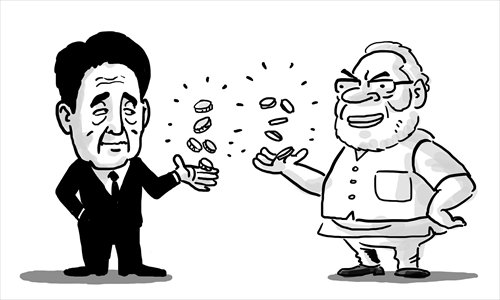Japan-India ties face huge uncertainty

Illustration: Liu Rui/GT
India Prime Minister Narendra Modi is on a four-day state visit to Japan starting Sunday. The trip is aimed at deepening cooperation in political, security, economic and personal exchanges. And Tokyo looks forward to reinforcing air and maritime military cooperation and increasing export of high-speed railway and nuclear power to India.
As two Asian powers, how the growing intimacy between Japan and India coordinates with US "rebalancing to Asia" strategy and cooperates with BRICS member states will wield direct influence upon regional architecture. Therefore this solicits plenty of attention.
How Modi's economic policy and Abenomics supplement each other is expected to be the biggest highlight of this trip.
Before assuming office as prime minister, Modi led the state of Gujarat to achieve an economic miracle through implementing deregulation, expanding investment in infrastructure, and actively attracting foreign capital. And Abe has been promoting Abenomics with economic reform, fiscal expansion and a quantitative easing monetary policy.
With its reform since the 1990s, India has seen an exploding population, active investment, and infrastructure construction lagging behind economic development. In particular, the previous government provided excessive subsidies, leaving its revenue in the red.
Ushering in the 21st century, Japan has been strengthening its cooperation with India and ramping up infrastructure export there.
During his India visit early this year, Abe increased the official development assistance to India to 210 billion yen ($2.02 billion) and provided a program worth $4.5 billion to obtain orders for Japanese nuclear power firms.
The Japan-India economic partnership agreement took effect in August 2011, since when Japan has become the fourth largest investor in India.
Abe's cabinet has highlighted cooperation in finance and currency exchanges since the beginning of this year. Tokyo attaches great importance to India's vast market and infrastructure projects.
However, Modi is more inclined to attract investment from Japanese firms to help with the manufacturing industry.
Security is another area of cooperation between the two nations. When Abe traveled to India early this year, he proposed beefing up the cooperation between the two national security committees. This time, they will probably launch a "two plus two" mechanism of diplomacy and defense to intensify their collaboration in air and sea.
For Tokyo, the sea lane from the Middle East, Africa and the Indian Ocean is a lifeline, and therefore whether it can gain the support of New Delhi is quite important.
Furthermore, Beijing's improving maritime strategies and the development of China-India strategic relations will inevitably exert far-reaching influence upon Japan's strategic resources, channels and markets. Consequently, dividing China and India has become a key issue for Abe.
At present, Washington has its strategic focus in East Asia, but a potential focal point is the Indian Ocean. Thereby how to coordinate the US "pivot to Asia" policy has become an inevitable conundrum for Tokyo.
Meanwhile, BRICS agreed to establish their own development bank, ushering Sino-Indian strategic cooperation into a new historical era. Tokyo and New Delhi must consider the coexistence of China, Japan and the US in the region when promoting their security cooperation.
As for nuclear energy cooperation, Japan and India should take into account the interactions within the international order.
They have been launching nuclear energy cooperation negotiations, but the key lies in how to tackle the Treaty on the Non-Proliferation of Nuclear Weapons (NPT).
India is a nuclear weapon state, but has yet to join the NPT. Japan once suffered the blow of nuclear strikes, and now it has been pushed to the front line of non-proliferation by the US.
Peaceful use and non-proliferation of nuclear energy interact with each other, composing a critical element in the current international order. With changing US-India relations in nuclear energy and Australia's decision to export nuclear fuel to New Delhi, it is uncertain how the two will cooperate.
All in all, the Japan-India relationship, in the context of current international politics, witnesses too many uncertain actors in its development.
The author is director of the Center for Globalization Studies and research fellow with the Institute of Japanese Studies, China Institutes of Contemporary International Relations. opinion@globaltimes.com.cn